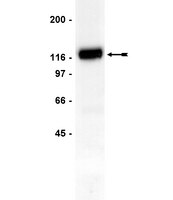SH3KBP1-binding protein 1 prevents epidermal growth factor receptor degradation by the interruption of c-Cbl-CIN85 complex.
Feng L, Wang JT, Jin H, Qian K, Geng JG
Cell biochemistry and function
29
589-96. doi
2010
Show Abstract
The binding of Cbl-interacting protein of 85 kDa (CIN85) to c-Cbl is important to endocytosis and degradation of epidermal growth factor receptor (EGFR). The proline-arginine motif PXXXPR in c-Cbl and SH3 domains of CIN85 are essential to this interaction. Here, we demonstrated that SH3KBP1-binding protein 1 (SHKBP1), which also contains two PXXXPR motifs, constitutively bound to SH3 domains of CIN85. Importantly, the binding of SHKBP1 prevented the interaction of CIN85 with c-Cbl and inhibited the translocation of CIN85 to EGFR-containing vesicles, thus reducing EGFR degradation and enhancing EGF-induced serum response element transcription activity. Therefore, our results indicated that SHKBP1 could promote EGFR signaling pathway by interrupting c-Cbl-CIN85 complex and inhibiting EGFR degradation.Copyright © 2011 John Wiley & Sons, Ltd. | 21830225
 |
Cbl-b is a negative regulator of inflammatory cytokines produced by IgE-activated mast cells.
Sonja E Gustin, Christine B F Thien, Wallace Y Langdon
Journal of immunology (Baltimore, Md. : 1950)
177
5980-9
2005
Show Abstract
c-Cbl and Cbl-b E3 ubiquitin ligases are abundantly expressed in hemopoietic cells where they negatively regulate the activity and levels of many cell surface receptors and associated signaling molecules. By comparing bone marrow-derived mast cells from c-Cbl and Cbl-b-deficient mice it has recently been shown that Cbl-b is the dominant family member for negatively regulating signaling responses from high-affinity IgE receptors. In this study, we suggest that a possible reason for the greater enhancement of IgE receptor signaling in Cbl-b-deficient mice is the relatively higher levels of Cbl-b protein over c-Cbl in mast cells compared with other hemopoietic cells. We also directly compare mast cells from c-Cbl and Cbl-b-deficient mice and find that loss of Cbl-b, but not c-Cbl, increases cell growth, retards receptor internalization, and causes the sustained tyrosine phosphorylation of Syk and its substrates. However, loss of Cbl-b does not enhance the activation of ERK or Akt, nor does it promote a greater calcium response. Furthermore, loss of Cbl-b or c-Cbl does not increase levels of the Syk or Lyn protein tyrosine kinases. Most notable, however, is the extremely large increase in the production of proinflammatory cytokines TNF-alpha, IL-6, and MCP-1 by Cbl-b(-/-) mast cells compared with levels produced by c-Cbl(-/-) or wild-type cells. This marked induction, which appears to be restricted to these three cytokines, is dependent on IgE receptor activation and correlates with enhanced IkappaB kinase phosphorylation. Thus, Cbl-b functions as a potent negative regulator of cytokines that promote allergic and inflammatory reactions. | 17056522
 |










